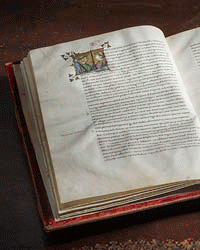Albert Einstein's violin is coming under the hammer at Dominic Winter's in South Cerney, Cirencester, on Wednesday 8 October, with an estimate of £200,000-300,000.
The 1894 violin, made by the Munich-based Anton Zunterer, is believed to be the first violin Einstein ever bought himself, shortly before he left Munich that year to continue his schooling in Arrau, Switzerland. Besides the maker's dated label inside the violin there is the word 'Lina' (short for violina) etched by Einstein on the back of the violin. The violin’s parts all appear to be original, except the later strings, the tail loop and fine-tuning screw. The next fully documented violin Einstein bought was in 1919, and it seems likely that was the violin he took with him when he left for the United States at the end of 1932.
Einstein would have been 5 or 6 when his mother bought him a child's violin, progressing through half and three-quarter size violins to a full-size violin by the time he was around 11. This would have been in 1890 when he was still having regular lessons. Einstein played the violin almost every day throughout his life, and even gave public performances, but sadly there are no known recordings of him playing. Einstein himself said that he would have liked to have been a musician had he not been a physicist.
This full-size Zunterer violin, along with his bicycle, the saddle order form, and a philosophy book were given to his good friend and physicist colleague Max von Laue in late 1932, when Einstein was about to leave Germany for America. Twenty years later, Max von Laue generously gifted the items to a friendly acquaintance and Einstein fan, Mrs Margarete Hommrich from Braunschweig. With the story recounted by her family innumerable times down the years, these treasured possessions are now, over 70 years later, being put up for sale by Mrs Hommrich's great-great granddaughter.
"We are thrilled to be handling these extraordinary historical artefacts," said senior auctioneer and historical memorabilia specialist Chris Albury. "Alongside autographs, documents and manuscripts we have always taken an interest in historical artefacts and quirky items. In the past we have sold one of Napoleon's teeth, a Madame Tussauds waxwork of Winston Churchill, a blood-stained handkerchief from the scaffold of King Charles I, and numerous pieces of royal clothing and wedding cake. Nonetheless, Einstein's violin is a particularly precious and exciting item to handle."
"When it arrived for analysis and valuation the violin's sound post and bridge were both detached and it had not been played for a very long time. This was easily rectified professionally and a short performance with it can be heard on our website. We know that Einstein named all his violins 'Lina', so to see this etched onto the back panel was hair-raising.”
“Von Laue had later disposed of the bicycle when it seized up, but he kept this leather saddle as it was so comfortable. Remarkably, the original Nelson saddle order form, completed, dated and signed in Einstein's hand was also retained and is offered with the saddle.”
"Interestingly, a cellist called Oscar H. Steger crafted and gifted a violin to Einstein when he arrived in the United States in 1933. That Steger violin sold for $516,500 (about £370,000) in New York in March 2018. In my opinion, this Zunterer ‘Lina’ violin is much more important, as it would seem to be the one he would have been playing from his later teens and through his early adult life, most notably when he published his important papers on relativity in 1905 and 1915. It is spine-tingling to think that he would have been playing pieces by his beloved Mozart and Bach while his young mind was thinking through his revolutionary ideas, many of which still underpin so much scientific and technological research today."
"We have estimated the violin at £200,000-300,000, in line with the Steger violin price. We consider the bicycle saddle (and signed order form) a very special item too, at the more modest estimate of £30,000-50,000. Einstein was a keen cyclist and cycled, not just for transport, but for inspiration for his scientific ideas. He once said, in a letter to his son Eduard in 1930, that 'Life is like riding a bicycle, to keep your balance, you must keep moving'.”
“The final item, the Descartes and Spinoza philosophy book, is signed in pencil twice by Einstein on the spine label. There are some intriguing but largely indistinct pencil annotations and marks in the Latin text, but it is not possible to say if these too are in Einstein's hand, as seems likely. This is another very personal item, having been given to Einstein by his father Hermann to encourage him to learn Latin. Whether that helped Albert or not, (he was apparently not very good at languages), he did become interested in the philosophy of religion and the existence of God, a subject about which he had complex ideas. He championed the 'pantheistic' ideas of Spinoza, one of the two authors in this book, famously stating, ‘I believe in Spinoza’s God’. The estimate for this volume is a far more affordable £2,000-3,000."
“It is impossible to say who will buy these three fabulous items, and if anyone might try to buy all three. I expect we will get private and institutional interest from around the world and we will only find out what will happen come the auction day itself. The ‘Titanic violin’, played by bandleader Wallace Hartley as the ship sank, sold for £900,000 in October 2013, so all one can say is that with these special kinds of auction artefacts absolutely anything can happen on the day. We just hope to end on a high note!”
For further information, please contact:
Chris Albury
Senior Auctioneer & Valuer
Books, Photographs, Autographs, Manuscripts, Documents & Ephemera, Historical Memorabilia
Dominic Winter Auctioneers Ltd (est. 1988)
Mallard House, Broadway Lane, South Cerney, Cirencester, Gloucestershire, GL7 5UQ
chris@dominicwinter.co.uk | 01285 860006 | www.dominicwinter.co.uk

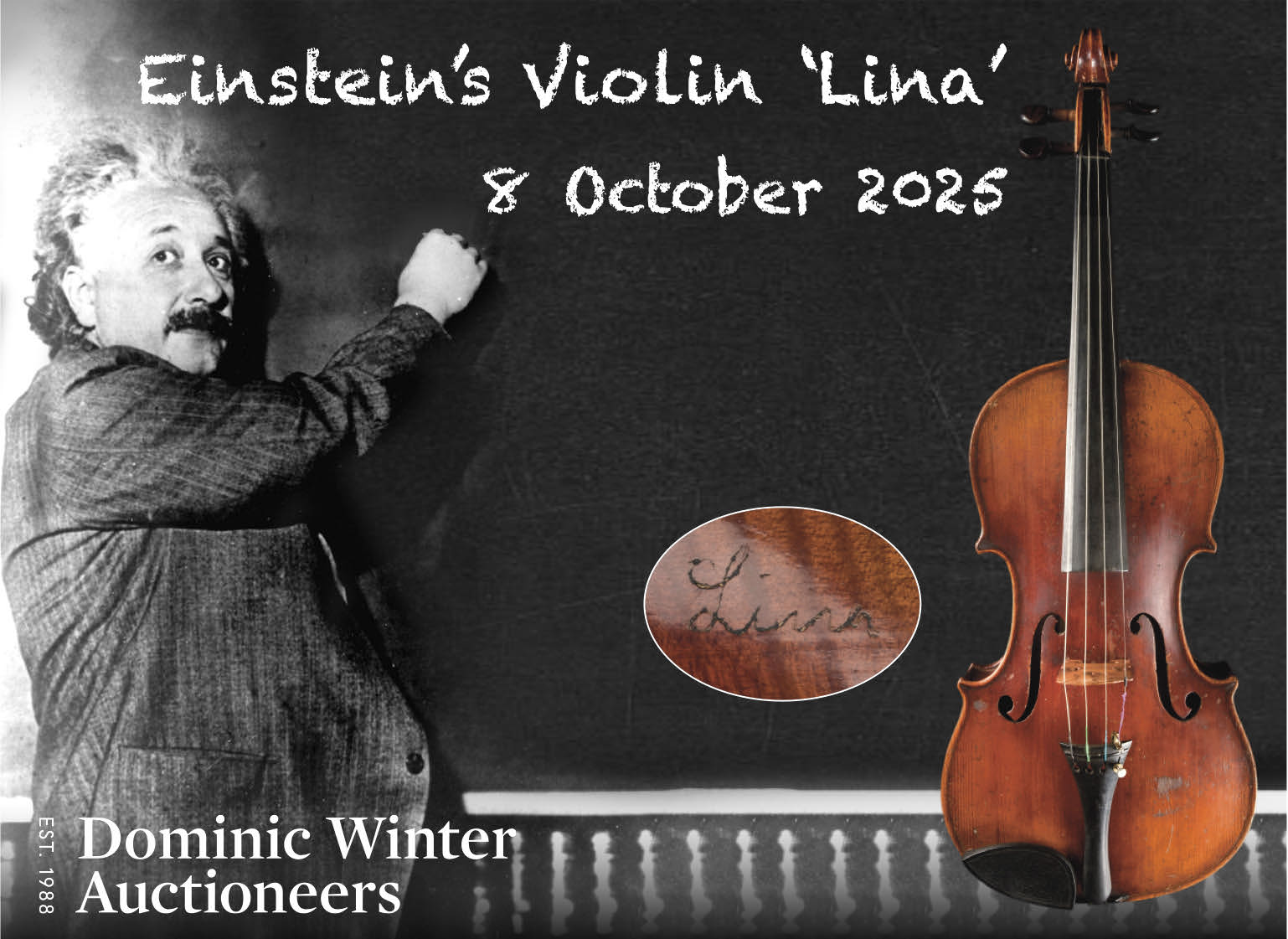
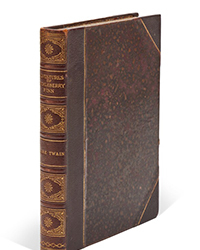
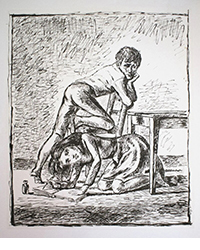
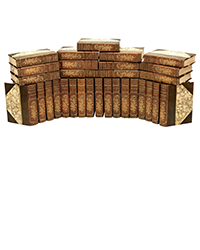
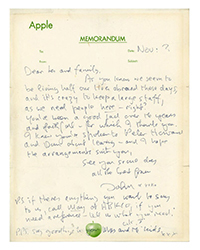
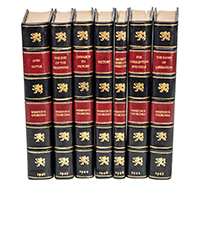
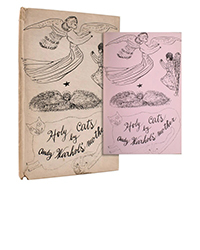
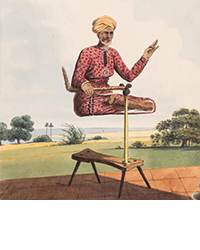
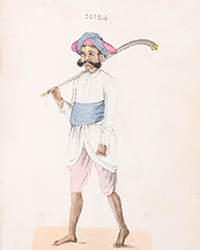
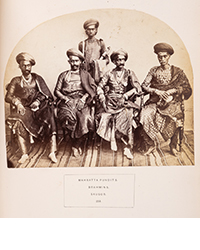
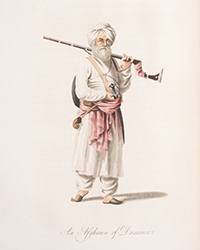
![<b>Forum, Feb. 19:</b> Lot 57<br>[Album and Treatise on Hinduism], manuscript treatise on Hinduism in French, 31 watercolours of Hindu deities, Pondicherry, 1865. £3,000-4,000 <b>Forum, Feb. 19:</b> Lot 57<br>[Album and Treatise on Hinduism], manuscript treatise on Hinduism in French, 31 watercolours of Hindu deities, Pondicherry, 1865. £3,000-4,000](https://ae-files.s3.amazonaws.com/AdvertisementPhotos/f70b3790-9b4a-4990-b402-f0322021c0de.jpg)
![<b>Forum, Feb. 19:</b> Lot 62 Allan (Capt. Alexander). <i>Views in the Mysore Country,</i>
[1794]. £2,000-3,000 <b>Forum, Feb. 19:</b> Lot 62 Allan (Capt. Alexander). <i>Views in the Mysore Country,</i>
[1794]. £2,000-3,000](https://ae-files.s3.amazonaws.com/AdvertisementPhotos/ad2cf7b4-4d93-4231-a956-b440583b39b3.jpg)
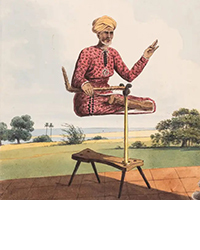
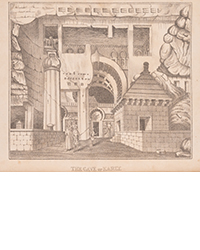
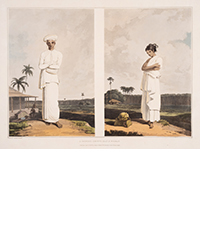
![<b>Forum, Feb. 19:</b> Lot 123<br>D'Oyly (Charles). <i>Behar Amateur Lithographic Scrap Book,</i> lithographed throughout with title and 55 plates mounted on 43 paper leaves, [Patna], [1828]. £3,000-5,000 <b>Forum, Feb. 19:</b> Lot 123<br>D'Oyly (Charles). <i>Behar Amateur Lithographic Scrap Book,</i> lithographed throughout with title and 55 plates mounted on 43 paper leaves, [Patna], [1828]. £3,000-5,000](https://ae-files.s3.amazonaws.com/AdvertisementPhotos/5651043b-3c0d-4e2c-931f-72133bda9b36.jpg)
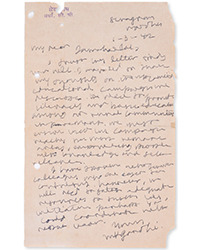
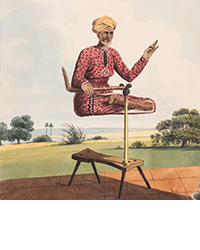
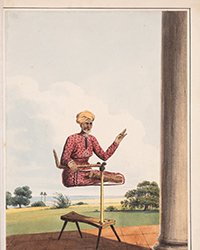
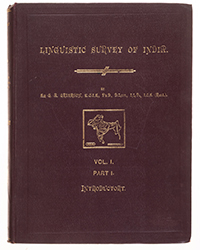
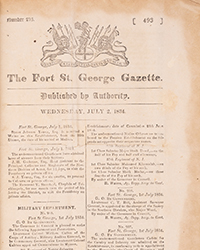
![<b>Forum, Feb. 19:</b> Lot 205<br>Marshall (Sir John) and Alfred Foucher. <i>The Monuments of Sanchi,</i> 3 vol., first edition, 141 plates, most photogravure, [Calcutta], [1940]. £3,000-4,000 <b>Forum, Feb. 19:</b> Lot 205<br>Marshall (Sir John) and Alfred Foucher. <i>The Monuments of Sanchi,</i> 3 vol., first edition, 141 plates, most photogravure, [Calcutta], [1940]. £3,000-4,000](https://ae-files.s3.amazonaws.com/AdvertisementPhotos/8c8244b7-4573-44d3-9c70-e0d3a3ed3cc4.jpg)
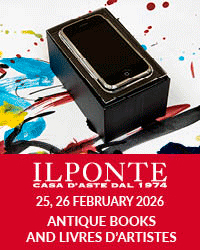
![<b>Il Ponte, Feb. 25-26:</b> HAMILTON, Sir William (1730-1803) - Campi Phlegraei. Napoli: [Pietro Fabris], 1776, 1779. € 30.000 - 50.000 <b>Il Ponte, Feb. 25-26:</b> HAMILTON, Sir William (1730-1803) - Campi Phlegraei. Napoli: [Pietro Fabris], 1776, 1779. € 30.000 - 50.000](https://ae-files.s3.amazonaws.com/AdvertisementPhotos/0372eeb9-97e1-47b2-baca-b3287d4704ee.jpg)
![<b>Il Ponte, Feb. 25-26:</b> [MORTIER] - BLAEU, Joannes (1596-1673) - Het Nieuw Stede Boek van Italie. Amsterdam: Pieter Mortier, 1704-1705. € 15.000 - 25.000 <b>Il Ponte, Feb. 25-26:</b> [MORTIER] - BLAEU, Joannes (1596-1673) - Het Nieuw Stede Boek van Italie. Amsterdam: Pieter Mortier, 1704-1705. € 15.000 - 25.000](https://ae-files.s3.amazonaws.com/AdvertisementPhotos/8f9ce440-b420-4407-8293-eb8e1b38ca19.jpg)
![<b>Il Ponte, Feb. 25-26:</b> TULLIO D'ALBISOLA (1899-1971) - Bruno MUNARI (1907-1998) - L'Anguria lirica (lungo poema passionale). Roma e Savona: Edizioni Futuriste di Poesia, senza data [ma 1933?]. € 20.000 - 30.000 <b>Il Ponte, Feb. 25-26:</b> TULLIO D'ALBISOLA (1899-1971) - Bruno MUNARI (1907-1998) - L'Anguria lirica (lungo poema passionale). Roma e Savona: Edizioni Futuriste di Poesia, senza data [ma 1933?]. € 20.000 - 30.000](https://ae-files.s3.amazonaws.com/AdvertisementPhotos/71bb9667-5d66-4aa8-96a2-9880c74a7a26.jpg)
